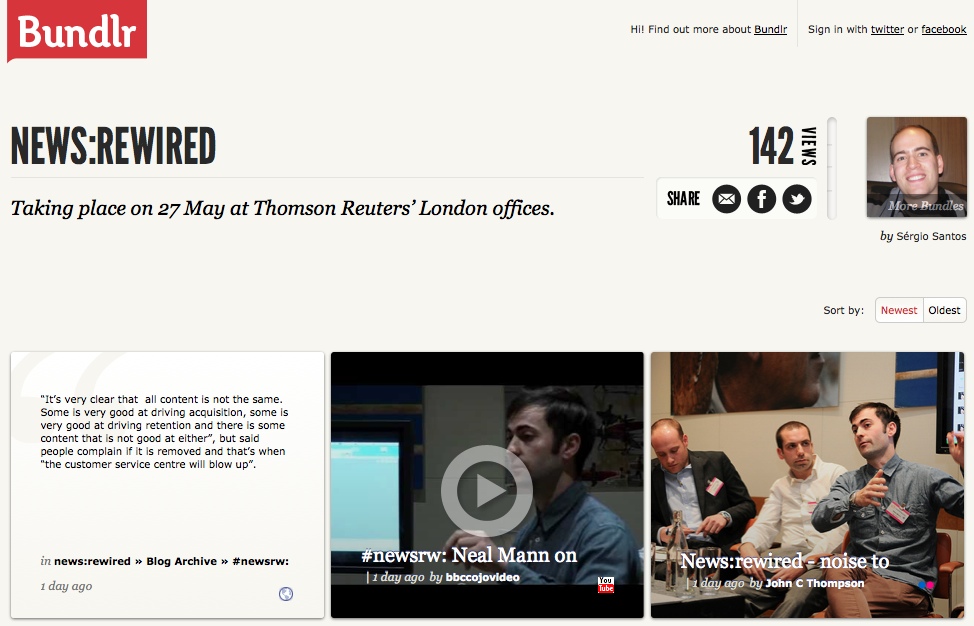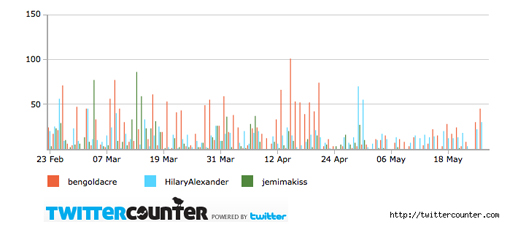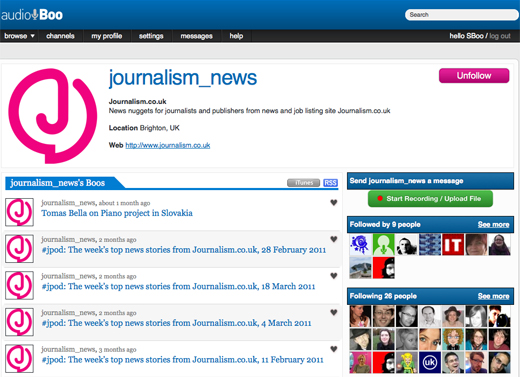Various delegates from the BBC Social Media Summit last week have spent the weekend writing blog posts reflecting on the two-day event.
If you are looking for a concise round-up of the main points of the day, go to Martin Belam’s notes from the BBC Social Media Summit.
He explains Al Jazeera‘s defence of criticism it received for being part of the story of the Arab uprisings, not just reporting it. He also reports that the New York Times is to experiment with its Twitter feed so that it becomes “a fully human experience without the automated headlines being pumped through it”.
If you want more detail, see Adam Tinworth’s series of live blogs, like this one on the session on technology and innovation.
Dave Wyllie also provides a good session-by-session summary in his core values post. He also reflects:
I left with the feeling that journalism is moving at great speed with some promising entrepreneurs and future figures emerging in their own startups. The rest are working in established businesses or broadcasting.
It’s UK based print I’m worried about, many didn’t even turn up. Maybe they didn’t get the invite or maybe they thought we were full of shit.
The most thought-provoking blog is from Mary Hamilton in her blog #bbcsms: what I learned about ego, opinion, art and commerce. She takes up the repeated use of the term ‘mainstream’.
Perhaps a more honest hashtag would be #bbcmsmsms. But it’s also telling: those who were invited to participate, and thus set the agenda and drive change, were not social media people from the Sun, or from Archant’s local divisions, or from the Financial Times. Of course it’s easier for organisations working with likeminded people to reach a consensus, but in doing so we miss the chance to learn from people outside the echo chamber.
So, like Wyllie, Hamilton also notes the absence of the UK regional news organisations. She goes on to say that issues raised may have been different if they had been there.
Esra Dogramaci of Al Jazeera faced some very hostile questioning on the topic of training people to use citizen journalism tools. Will Perrin of Talk About Local did not. Of course there are hundreds of reasons why the responses were different – not least the potential harm that people in Arabic dictatorships can come to as a result of doing journalism – but one of them is territory. Al Jazeera is invading the “mainstream”. Talk About Local is invading the regional space. If there had been many Archant, Johnston or Trinity Mirror folks there, I think Will would have faced some tricky interrogation too.
She makes some interesting points on the ‘fight to be first’:
There’s still significant opposition to this notion from both individual journalists and news organisations. We fear being scooped. Outside the financial trade press, where being first by a few seconds can move markets, the business model of being first is largely an illusion. In fact, the business model is in being the most widely read, and being first is no longer a guarantee that you will gather the most eyeballs for your effort.
The fight to be first stifles innovation, because it erases partner contributions. Traditional media have always done this with stories. Now we are seeing it with innovations, too – even with innovative ways of using familiar tools. The NYT can commit to their experiment of turning off the auto-feed on their Twitter account; this isn’t new, and it’s in part because other news organisations have succeeded that the NYT can experiment without too much fear of failure.
At the end of the day, Alan Rusbridger claimed that the Guardian invented live-blogging. That stakes a claim, draws a line around an innovation that is simply a new way of using a tool, that has existed for nearly as long as the tool has existed. And suddenly, we are fighting over the origin of the thing, rather than celebrating its existence and finding new ways to use it. Suddenly it’s all about the process, about who scooped who, not about the meaning of the events themselves.
Round and round we go.
In his post #bbcsms and the ethic of the link Joseph Stashko discusses circular arguments. He says that one of sessions adopted the wrong starting point:
So when the session titled ‘Can startups compete with mainstream media?’ began I was somewhat puzzled.
The discussion that followed was very good, but the question was framed in the wrong way. It attempted to compare two different things. They shouldn’t be looking to compete with each other, because it takes us back to a bloggers vs journalists style debate again – the two should look to complement each other rather than compete.
It’s a mindset which seemed to be uncomfortably pervasive throughout the day. As someone remarked to me afterwards “I thought we were over that sort of debate…apparently not”.
He goes on to say:
In 2011 I don’t think we should be asking the questions that are based around what the roles of startups and mainstream media are. Mainstream media have recognisable brands, huge manpower, contacts, prestige and reach. Startups are more nimble, can specialise easily and can get things done quicker.
When I want to start work on a new project, I don’t identify someone who can do things that I can’t and then try and learn all their skills myself – I ask them to come and help me. It’s madness that we’re still having to debate this, but possibly appropriate given that it was held at the BBC.
He asks three questions of the point of such conferences:
How many more case studies of Twitter do we really need?
How many more examples of how you can harness the wisdom of crowds?
And how many more discussions about the futility of mainstream media building their own versions of existing services rather than employing the ethic of the link to connect people to knowledge?
The Media Blog also asks a question in its post journalism, is it ever ‘just a numbers game’? Here it’s worth noting Wyllie’s summary of the session which explains that “the room seemed to divide into two camps: live by your stats to influence your content OR ignore stats for they are perverse and influence you in the wrong ways”.
The Media Blog takes the example of the Daily Mail’s website.
And while it is difficult to cast either extreme of the Mail’s split personality as quality journalism, it is clear that simply chasing clicks with pics and key words is not. For example, a Google search for US socialite and ‘home movie’ star “Kim Kardashian” on the Daily Mail website returns 186,000 results. A search for “Kim Kardashian”+”bikini” returns just 1,000 fewer – 185,000 results – which is still more than results for “David Cameron” and “Gordon Brown” put together.
But asking if journalism and web traffic is ‘just a numbers game’ the post acknowledges that not all stories generate hundreds – let alone hundreds of thousands – of clicks and questions the “business sense” of editorial decisions in only selecting stories which generate hits which “is to assume that all important news would also have the good grace to be popular news”.
Publishers just need to remember the subtle differences between getting more readers to their content and producing content purely to bring in more readers. Somewhere between the two lies a dividing line marked ‘quality journalism’.
So what about the future? Mary Hamilton suggests an opening up:
We need people who take elements not just from journalism but also from other areas: user experience design, anthropology, web culture, psychology, history, games, literature, art, statistics. We need to interrogate journalism with tools outside the journalistic sphere; we need not just to borrow from other disciplines but exchange with them.
And comment below Hamilton’s post expands this further:
Your last point is a valid, and reflects what I took out of the day; innovators and non-mainstream thinkers are looking to be involved, traditional outlets are sitting back and waiting for invites. They should be the ones sending out the innovations.
“With capability comes responsibility”, I believe was one of the finer quotes of the day.



